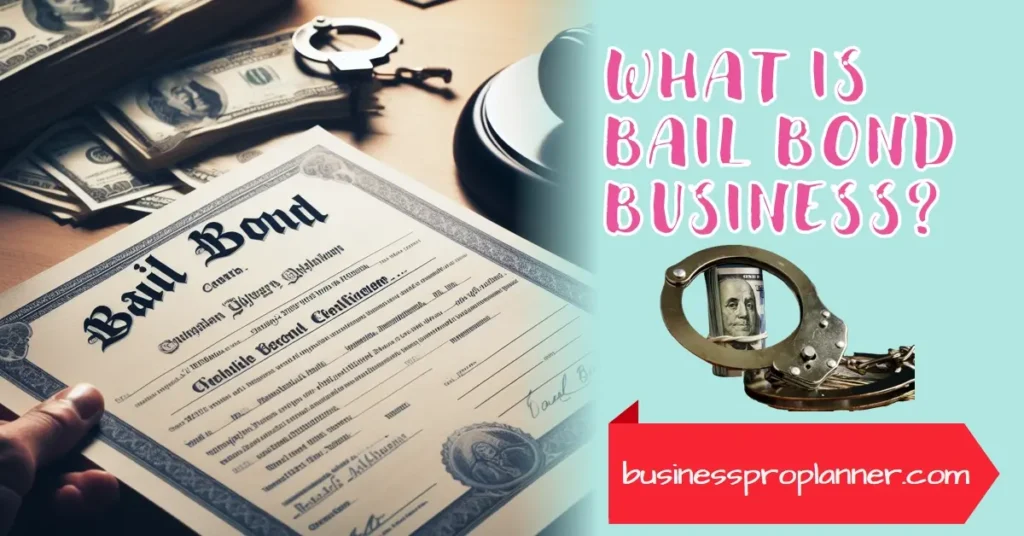The bail bond business plays an important role in the criminal justice system by facilitating the pre-trial release of accused individuals awaiting court hearings or trials. Starting and running a successful bail bond company requires a thorough understanding of the legal framework, operational aspects, and business dynamics of this niche yet growing industry. This guide focuses on how aspiring business owners can start a successful bail bond business and also provides a comprehensive overview of establishing and operating a bail bond company.
Key Takeaways
- The bail bond business provides a valuable service but requires licensing, sufficient capital, and strong relationships.
- Conduct extensive research into legal requirements, costs, profitability, and trends in your state.
- Create a detailed business plan covering operations, marketing, financing, processes, contacts, and growth.
- Relationships with courts, attorneys, and law enforcement are crucial – focus on outreach and reliability.
- Manage finances closely, pursue marketing consistently, and leverage technology to grow your client base.
What is a Bail Bond Business?
A bail bond company, also called a bail bond agency, is a business that provides bonding services to defendants who cannot afford to pay the full bail amount set by the court. The company will charge the defendant a percentage fee, usually 10% of the bail amount, to post a surety bond. This allows the defendant to be released from jail until their court date.

If the defendant misses their court appearance, the bondsman is liable for the full bail amount. Bail bondsmen may hire bounty hunters to track down such defendants.
The bail bond business serves an important role in the legal system by allowing defendants to be released while ensuring they appear in court. However, it involves substantial risk and regulation.
Evaluating Business Suitability
Before launching a bail bond venture, carefully examine the industry landscape and evaluate if it aligns with your skills, interests, and financial resources.
Industry Size and Growth
The bail bond industry consists of over 10,000 bail bond agencies employing over 30,000 people across the United States. It is a multi-billion dollar industry dominated by a few large national companies. Some key points about the industry:
- The total bail bond market size is estimated at over $2 billion annually in the U.S.
- Certain states like California, Texas, and Florida generate a major share of the overall bail bond business due to high crime rates and larger populations.
- The industry saw steady 3-5% annual growth over the last decade driven by increasing crime rates and numbers of bail-eligible cases.
- Pandemic-driven bail reforms and social justice movements led to alternative pre-trial release programs in some areas, slowing growth.
Decide If the Business is Right For You
Some factors to consider in deciding to start a bail bond business is suitable:
- Willingness to work in a dynamic, regulated industry interfacing frequently with law enforcement and legal processes
- Ability to obtain the necessary bail bond licenses and surety from major insurance companies
- Access to initial startup capital of $50,000 – $100,000 for licensing, insurance, equipment, and operational expenses
- Capacity to work long, odd hours and be available at all times since bail needs are unpredictable
- Preference and skills for sales, customer service, and working independently with minimal supervision
Evaluating personal strengths, constraints, and suitability for this industry based on the above points will help determine the feasibility of starting a bail bond company.
Pros and Cons of Starting a Bail Bond Business
Pros:
- Opportunity to own a profitable small business
- High-profit potential with no direct education requirements
- Stable industry demand is driven by regular caseload from the legal system
- Flexible hours and independence
- High earning potential
- Helping people through a challenging process
- Low overhead costs for a service-based business
- Opportunity to develop long-term client relationships
- Excitement of the bonding process
Cons:
- Substantial startup costs and ongoing overheads
- Significant regulatory compliance and paperwork burden
- High-risk and complex regulations.
- Risk of loss if clients skip bail and do not pay bond amounts
- The stress of working in a high-pressure law enforcement adjacent field and erratic hours
- Safety risks in apprehending skipping defendants
- Unpredictable cash flows dependent on bail volumes and amounts
- Admin demands like paperwork and bookkeeping
Industry Trends and Challenges
- Increased regulation and licensing requirements
- Rise of bail reform movements advocating reduced or no cash bail
- Public scrutiny around practices like bounty hunting
- Technology simplifies processes but raises customer expectations
Starting Costs for a Bail Bond Business
Typical startup costs for a new bail bond company range from $50,000 to $100,000 and include:
- Licensing and permit fees (average $5,000 to $10,000)
- A surety bond from a licensed insurance company (average $25,000 to $50,000)
- Office equipment, signage, and furnishings (average $5,000 to $10,000)
- Software, tech infrastructure, and website costs (average $2,000 to $5,000)
- Initial operating expenses before first client (3 to 6 months expenses)
- Marketing budget for the first 6 months (average $5,000 to $10,000)
Having access to enough capital to cover these initial costs is essential before launching a bail bond business.
Profitability Analysis
On average, bail bond agencies can expect the following profitability metrics:
- Bond fee retention percentage: 85-95% of bond fees go to the agency, rest to the insurance company
- Bond amount: $5,000 minimum, average $25,000 to $50,000
- Bond fee rate: 8-15% of bond amount, usually 10% or $2,500 on average
- Operating expenses ratio: 55-65% of revenue goes towards expenses
- Net profit ratio: 25-40% of revenue becomes net profit
With a good case volume, most agencies can achieve a six-figure annual net profit within 2-3 years of operations if expenses are managed well. Steady growth can increase this over time.
Favorable State Markets
Some states and regions have stronger bail bond industry demand due to socio-economic and legal factors:
- California, Florida, New York, and Texas witness the highest bail volumes nationally
- States with more populated urban centers see higher crime rates and bail incidence
- Areas with higher poverty levels may rely more on bail bondsmen over other options
- Jurisdictions that set bail amounts higher contribute to the demand
Researching crime statistics, poverty levels, and population trends in your target location can help forecast bail bond business potential and viability. Focusing operations near courts sees the maximum feasible volume.
Key Steps to Start a Bail Bond Business
Launching a bail bond company takes significant legal compliance, planning, relationships, and financing. Follow these crucial steps to start your own bail bond business:

Step 1: Understand Legal Requirements and Licensing
The bail bondsman industry is heavily regulated, so you must fully understand and comply with state licensing regulations, such as:
- Passing licensing exams
- Completing pre-licensing education
- Meeting experience requirements
- Obtaining proper insurance and bonds
- Registering your business name
- Paying fees to the Department of Insurance
Requirements vary by state, so conduct extensive research.
Step 2: Develop a Strong Business Plan
Creating a detailed business plan is vital for success. It should cover:
- Your business structure – LLC, corporation, etc.
- Operational plan and processes
- Staffing needs and responsibilities
- Marketing strategy and tactics
- Technology and equipment needs
- Financial planning and projections
- Licenses and insurance required
- Short and long-term growth strategies
Step 3: Obtain Financing and Surety Bonds
As a startup, you will need substantial capital from sources like savings, investors, business loans, and credit cards. Expect around $50,000+ in startup costs for things like:
- Licensing and bonds
- Office space and equipment
- Vehicles
- Marketing activities
- Operating expenses
You will also need to secure surety bonds to back defendants’ bail amounts.
Step 4: Build Relationships with Legal Contacts
Establishing strong relationships is crucial for getting referrals. Network extensively to build connections with:
- Local courts, judges, and clerks
- Defense attorneys and law firms
- Jails and sheriff departments
- Other bail bondsmen
Join industry associations and focus on providing reliable, responsive service.
Step 5: Market Your Bail Bond Services
Consistently promote your business through diverse marketing channels:
- Print ads in legal publications
- Direct mail campaigns to local attorneys
- Clear office signage and branded merchandise
- Social media marketing across platforms
- Search engine optimization
- Event sponsorships and partnerships
Convey professionalism and build online reviews.
Step 6: Manage Operations and Finances
As you launch, focus on:
- Careful financial management and cost control
- Building your client base through referrals and marketing
- Using technology to improve productivity and security
- Hiring talented staff once operations stabilize
- Staying compliant as you scale
Tips for Success Bail Bond Company
To kick-start and scale a bail bond business into a flourishing enterprise, focus on the essentials and adopt a strategic approach. Here’s how:
- Understand licensing and regulations within your state thoroughly. It’s the foundation of your legal operations.
- Secure enough capital to sustain your business for the first 6-12 months. This ensures stability as you grow.
- Develop a comprehensive business plan. Outline your operational strategies, financial management, and marketing approaches.
- Build relationships with legal professionals and local law enforcement. These connections are invaluable for referrals and operational insights.
- Implement strong cybersecurity measures to protect your clients’ data. Trust is critical in this business.
- Market your services through various channels. A consistent presence across digital and traditional media widens your reach.
- Deliver responsive and reliable service. Your clients’ satisfaction can turn them into advocates for your business.
- Use technology to enhance productivity and extend your market outreach. It can streamline processes and improve client interaction.
- Manage your finances meticulously, especially as your business scales. Keeping a tight rein on expenses and revenue is crucial for sustained growth.
- Stay informed about industry trends and changes. Continuous learning through classes and certifications keeps you ahead.
- Lastly, hire ethical and competent staff. A dedicated team supports your vision and contributes to a positive business reputation.
By following these tips, you can navigate the complexities of starting and growing a successful bail bond business. Remember, a blend of strategic planning, strong relationships, and ongoing education paves the way for long-term success.

Conclusion
The bail bond industry is crucial for maintaining justice and protecting individuals’ rights. With the right preparation and dedication, entrepreneurs can launch successful bail bondsman businesses. These agencies play a vital role, in serving both the courts and the community.
Becoming a bail bond agent requires understanding the nuances of working with a surety company and the ability to post bail for many. Success in this field often hinges on passing the National Bail Bond Agent exam and mastering the roles of both bail enforcement agents and bondsmen.
For those starting a bail bondsman business, it’s about more than just understanding the law; it’s about commitment to continuous learning and innovation. This approach ensures they remain competitive as the industry evolves. By focusing on these areas, business owners can build agencies that support justice while adapting to future changes in the bail bond sector.
